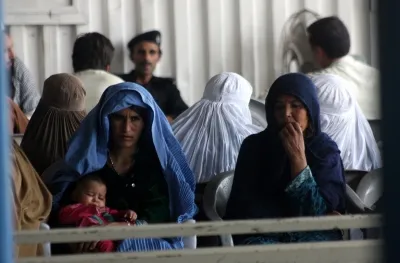Why Are Afghan Refugees Shying Away from Hospitals in Pakistan?

Synopsis
Key Takeaways
- Afghan refugees are avoiding hospitals due to fear of arrest.
- This trend poses serious health risks, especially for pregnant women.
- The HRCP emphasizes the need for adherence to human rights obligations.
- International organizations are advocating for humane treatment of refugees.
- Mass deportations could lead to increased risks for Afghan families.
Islamabad, Sep 24 (NationPress) The Human Rights Commission of Pakistan (HRCP) has expressed deep alarm over reports indicating that sick Afghan refugees are increasingly refraining from seeking medical care in hospitals throughout the nation due to fears of harassment and arrest by law enforcement.
According to the HRCP, numerous hospitals in Pakistan have denied treatment to individuals lacking valid visas.
Particularly concerning are the reports of pregnant women who urgently require medical assistance but are avoiding care due to fear.
“Such actions not only violate fundamental human dignity but also breach Pakistan’s constitutional and international human rights commitments, especially considering the peril that Afghan women and girls face if forced back to a nation practicing gender apartheid,” stated the HRCP.
Recently, Médecins Sans Frontières (MSF), an international medical humanitarian organization, highlighted that the fear of deportation has cultivated a climate of fear among Afghan nationals in Pakistan, causing many to forgo essential medical treatment, resulting in severe health repercussions.
“I cannot visit the clinic for treatment because I fear I will be arrested and deported. I have to skip my visit,” MSF reported an Afghan refugee as saying.
“Since the announcement of deportations, we live in constant fear. We avoid going out due to the threat of arrest. Families dread the night, uncertain if there will be a raid. The children are traumatized,” narrated another Afghan refugee.
Earlier this month, Pakistan persisted in implementing its strategy to deport approximately 1.4 million Afghans holding Proof of Registration (PoR) cards, despite multiple international entities urging a cessation of deportations, as reported by local media.
In addition to PoR holders, about 800,000 Afghans with citizenship cards from Afghanistan, residing illegally in Pakistan, are also at risk of deportation, according to Pakistani officials.
Pakistan's crackdown on Afghan migrants occurs amidst growing concerns regarding congestion at critical border checkpoints.
Humanitarian specialists have cautioned that mass deportations may expose Afghan families to increased threats, including economic distress, social instability, and potential exploitation at the border. International organizations have been advocating for dialogue between Pakistan and Afghanistan to ensure the safe and humane treatment of Afghan migrants.









